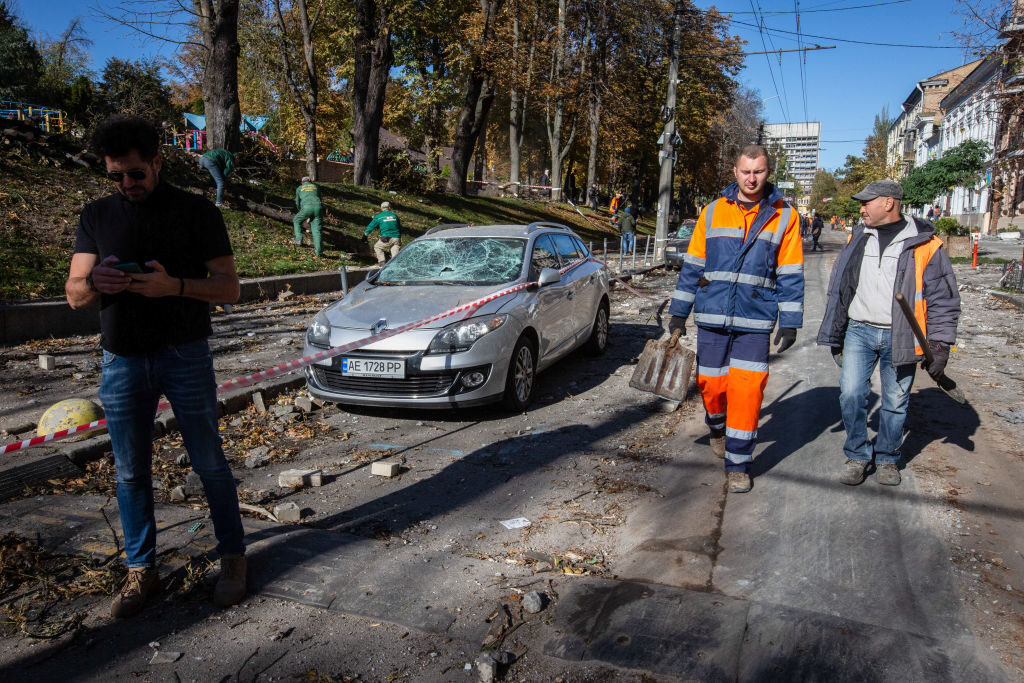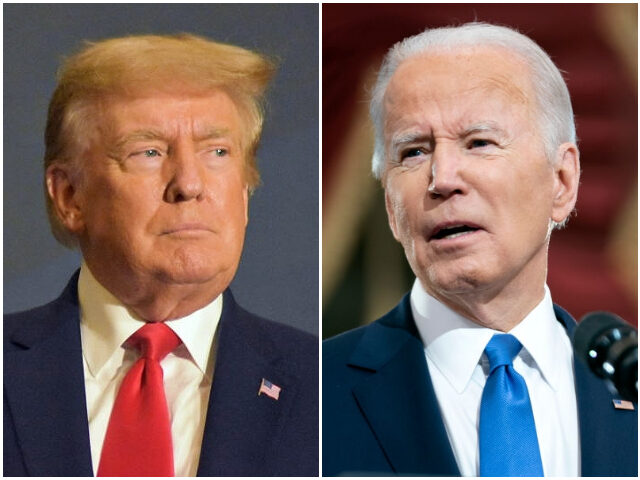Former President Donald Trump is warning Americans about the rising risk of a nuclear war, while current President Joe Biden is intensifying pressure on Russia’s president to give up his claim to territories long ruled by Russia.
“We must demand immediate negotiation of a peaceful end to the war in Ukraine. or we will end up in World War Three,” Trump told a rally in Mesa, Arizona, on Sunday, October 9, adding:
We will never have had a war like this and that’s all because of stupid people that don’t have a clue. And it’s also because of the kind of weaponry that’s available today. We never had weapons like this, the destructive capability of weapons, modern weapons. I know more about it than anybody because of the fact that I rebuilt our military.
Trump’s call for peace talks was matched on Sunday by Admiral Mike Mullen, a former chief of staff at the Pentagon. “The sooner the better as far as I’m concerned,” he told ABC News.
Trump also slammed Biden’s ability to contain the war between Biden-backed Ukraine and nuclear-armed Russia, headed by President Vladimir Putin:
We have a president who is cognitively impaired and in no condition to lead our country and is now casually talking about nuclear war with Russia, which would be World War Three and far more devastating than any of the previous wars because of the weaponry that no one even wants to think about or discuss.
Trump on Ukraine: "We must demand the immediate negotiation of a peaceful end to the war in Ukraine or we will end up in World War Three. And there will be nothing left of our planet — all because stupid people didn't have a clue… They don't understand the power of nuclear." pic.twitter.com/sCAqUVhQQl
— Phil Stewart (@phildstewart) October 9, 2022
Trump’ gave his speech a day after a critical bridge to Crimea was damaged in a still-unexplained attack, likely by U.S.-backed Ukrainian forces.
The attack marked an escalation and expansion of the war because the bridge is the only route from Russia to the Crimean peninsula that does not go through territory within Ukraine’s pre-war borders.
The status of Crimea is a key issue in the war, partly because Russia regards it as a Russian province and as vital to the security of its coastline along the Black Sea. The peninsula saw three years of brutal battles during Russia’s war to survive Naziism. In the 1850s, Russia defeated a naval invasion of Crimea by Britain and France.
Yet the United States is backing Ukraine’s claim to own the Crimean peninsula, which was captured in 1783 by Catherine the Great from the Turks. “Just to be clear, Crimea is Ukraine,’ Deputy Assistant Secretary of Defense Laura K. Cooper said on October 4.
In recent weeks, U.S. surveillance aircraft and U.S.-supplied guided weapons — such as satellite-guided artillery shells and heat-seeking missiles — have wrecked Russia’s advantages in tanks, artillery, manpower, and electronic warfare.
The U.S. has also disregarded the threat of widespread famine caused by Russia’s disruption of Ukrainian grain exports. The recent destruction of Russia’s undersea gas pipelines in the Baltic also ended Russia’s ability to pressure Europe for diplomatic concessions during winter.
In return, Russia has escalated by attacking Ukraine’s energy infrastructure.
German Consulate Hit in Wave of Russian Strikes Across Ukraine: Reports https://t.co/uDMbCJGLyr
— Breitbart London (@BreitbartLondon) October 10, 2022
More importantly, Putin has increasingly threatened to use nuclear weapons to regain his lost advantages:
I want to remind you that our country also has various means of destruction … and when the territorial integrity of our country is threatened, to protect Russia and our people, we will certainly use all the means at our disposal … It’s not a bluff.
U.S. officials have evaded questions about whether Russia has begun preparations to use nuclear weapons soon.
“We have not seen any reason to adjust our own strategic nuclear posture, nor do we have indications that Russia is preparing to imminently use [emphasis added] nuclear weapons,” White House spokeswoman Karine Jean-Pierre said on October 7.
Jean-Pierre’s “imminently use” response was a linguistic dodge. It suggests that the U.S. officials do see some Russian preparations, perhaps to test weapons before using them over Ukraine.
She also dodged the question by using the term “nuclear posture.” The term has long been used to describe the alert status and mobilization level of U.S. nuclear forces. In any crisis, officials would be reluctant to mobilize U.S. nuclear weapons for fear of causing a chain reaction with Russian nuclear forces. So the current lack of any U.S. nuclear mobilization says little about whether Russia is preparing to use short-range, smaller-scale “tactical” nuclear weapons against Ukraine.
Such Russian nuclear strikes could include high-altitude explosions that wreck electronic devices with an “Electromagnetic Pulse,” and low-altitude strikes that destroy ground targets while minimizing radioactive fallout.

Municipal workers walk near a damaged car after a Russian missile attack in central Kyiv. Explosions have been reported in several districts of the Ukrainian capital. At least 11 people died and dozens injured as a result of Russian rocket attacks targeting cities across Ukraine. (Oleksii Chumachenko/SOPA Images/LightRocket via Getty)
However, Biden has escalated his rhetoric to deter Russia from using nuclear weapons — even if Russia loses the war and subsequently faces years of political instability — without calling for a compromise deal.
On October 7, Biden joked about Russia’s battlefield losses to U.S. weapons, and threatened Russia with nuclear attacks if it starts using nuclear weapons against Ukrainian forces:
We’ve got a guy I know fairly well. He’s not joking when he talks about potential use tactical nuclear weapons or biological or chemical weapons because his military is, you might say, significantly underperforming. I don’t think there is any such thing as [their] ability to easily use a nuclear weapon and not end up with Armageddon [for Russia and other countries].
“We have not faced the prospect of Armageddon since [President John] Kennedy and the [1962] Cuban Missile Crisis,” Biden said.
Yet Biden also recognized the high stakes facing Putin and Russia as U.S. weaponry gradually destroys the Russian military: “Where does he find a way out? Where does he find himself in a position that he does not only lose face but significant power within Russia?”
Many Democrats will automatically oppose proposals pushed by Trump. But Trump’s call for negotiations was matched by October 9 comments from Mullen.
“I have to take Putin seriously,” Mullen told ABC News “This Week” show on October 9:
He has got lots of options with tactical nuclear weapon … I think he’s more and more dangerous just what has happened in the last 24 hours, that bridge was struck, which was logistically critical as well as very symbolic. So I think we have to take him seriously … It also speaks to the need, I think, to get to the table. I’m a little concerned about the language … President Biden’s language, we’re about at the top of the language scale, if you will. I think we need to back off that a little bit and do everything we possibly can to try to get to the table to resolve this thing.
…
We’ve been talking about it since before the crisis started an [compromise deal] for him. I suspect it’s in the east, if you will, with those four provinces or some combination of them with respect to how it all ends. And that really is up to, I think, Tony Blinken and other diplomats to figure out a way to get both [Ukraine president] Zelenskyy and Putin to the table. And as is typical in any war, it has got to end and usually there are negotiations associated with that.
Other U.S. advocates have been evasive. Michael McFaul, a former U.S. ambassador to Russia from 2012 to 2014, dodged the issue of compromise talks in a set of October 9 tweets:
Today, based on new events & circumstances, I believe that Putin is deterring us when threatening to use nuclear weapons. I still believe the probability of a nuclear attack is very low … And as I have written and said repeatedly, even if that threat level is .1%, Biden, [China’s president], and all responsible leaders in the world should be doing everything to reduce it to an even lower probability.
Similarly, a former U.S. ambassador to Ukraine, Steven Pifer wrote in the Bulletin of the Atomic Scientists:
But there are reasons to believe Moscow would not press the nuclear button. Such use would not end the Ukrainian determination to resist. It would alienate countries such as China and India that have tried to remain on the sidelines of this war. Moreover, senior Russian political and military leaders understand that introducing nuclear weapons into the conflict would constitute a step into a murky and potentially disastrous unknown.
…Doing so would open a Pandora’s box full of unpredictable, nasty, and potentially catastrophic consequences – including for Russia itself. If Moscow were to set down a nuclear path, it would have no idea – and even less control over – where it would lead.
Finland’s prime ministers scoffed at the suggestion of a diplomatic compromise:
Finnish prime minister Sanna Marin was asked about a potential off-ramp for Russia to end the war in Ukraine. Her reply: pic.twitter.com/VblWxkMuFc
— Rikhard Husu (@RikhardHusu) October 7, 2022
Foreign leaders who have little influence in the fight are trying to avoid the use of nuclear weapons. One day after Biden’s threat to Russia, France’s President Emmanuel Macron also urged caution: “I have always refused to engage in political fiction, and especially … when speaking of nuclear weapons … On this issue, we must be very careful.”
Trump, however, is likely to continue his criticism of Biden’s strategy in the war.
Trump’s recent criticism of Biden matched his prior statement in May when he told an interviewer that Biden’s administration is pushing Putin towards the use of nuclear weapons:
When you put [Putin] into a corner and you talk the way they’re talking – they’re talking weak – and they’re almost giving him an incentive … They’re handling him very badly, in my opinion.
“We have to be very smart and very nimble,” Trump said at the weekend rally. “We have to know what to say, what to do. And we are saying exactly the wrong thing. We’ll end up in a World War III.”

COMMENTS
Please let us know if you're having issues with commenting.